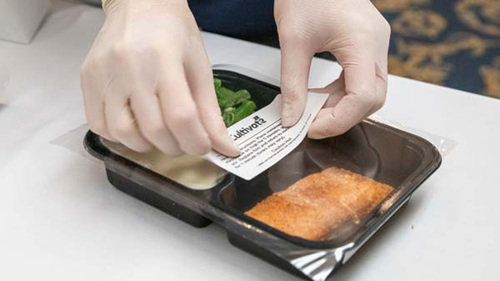
The University of Notre Dame has reached a milestone in its relationship with Cultivate Food Rescue: 100,000 pounds of food donated to the nonprofit to battle hunger and reduce food waste.
Since 2017, the University has donated 102,622 pounds of excess food to the food rescue organization from dining, athletics and special events, including home football and basketball games.
That’s the equivalent of 82,097 meals, with a tax value of more than $374,000.
“In the U.S., food waste is estimated at between 30 and 40 percent of the food supply,” said Carol Mullaney, senior director of sustainability at Notre Dame. “At Notre Dame, we are committed to tackling this problem, first through source reduction and, secondly, by getting consumable food to people who need it. Cultivate has been an invaluable partner to enable us to provide meals to those in need in our community.”
Cultivate provides free, frozen meals to primarily elementary age children via an insulated backpack program that, before the coronavirus pandemic, delivered 2,400 meals per week to children in St. Joseph, Elkhart and Marshall counties during the school year.
Since the pandemic, the organization has delivered 86,000 meals to K-12 students via revised school meal programs, plus 19,000 to local veterans, the Food Bank of Northern Indiana, the Marshall County Council on Aging and COVID-positive residents at the county isolation center, among other individuals and organizations.
The meals, consisting of excess, unserved food from some of the best chefs and kitchens in the area, are microwave ready and include a protein, vegetable, starch and occasional dessert.
The 100,000-pound milestone coincides with a sharp increase in demand for food assistance because of the coronavirus pandemic, which has contributed to widespread unemployment and rising food costs, and put a strain on local governments and social service organizations, both here and nationwide.
As the largest employer in the area, Notre Dame is also the largest donor to Cultivate, accounting for nearly 20 percent of all food donated to the organization since 2017.
In addition, student athletes volunteer with Cultivate as part of Community Commitment, a division of Notre Dame Athletics; the Office of Public Affairs and Communications assists Cultivate in the areas of marketing and communications; the William J. Shaw Center for Children and Families and the Center for Civic Innovation (CCI) help Cultivate collect and analyze data to better serve students and fill pantry shelves; and the Kelly Cares Foundation, the charitable foundation of Notre Dame Dick Corbett Head Football Coach Brian Kelly and Paqui Kelly, supports the backpack program.
Recently, in collaboration with CCI and Purdue extension of St. Joseph County, Cultivate was able to secure 1,700 gallons of milk per week for distribution to pantries and social service agencies in the tri-county area from June to August.
“Our partnership with Notre Dame started at a dining table two weeks into our food rescue mission. Their devotion to sustainability and to reduce food insecurity has propelled Cultivate from an unknown startup to a household name in our three counties,” said Jim Conklin, president and cofounder of Cultivate. “The unforeseen consequences of the coronavirus were not in anyone’s vision of 2020, but due to the support of Notre Dame and so many organizations throughout our community, we were perfectly placed to provide over 100,000 meals in a time of crisis. We are truly blessed to have the University, its employees and its students as partners in the Cultivate mission.”
Notre Dame’s relationship with Cultivate is part of a long-term sustainability strategy for the entire campus. In the past year alone, the University partnered with Grind2Energy and Homestead Dairy to convert food waste to energy; commissioned a new geothermal heating and cooling plant; announced a large-scale solar facility in partnership with Indiana Michigan Power; and broke ground on a hydroelectric facility at Seitz Park in South Bend.
On Oct. 15, the University ceased burning coal a year ahead of schedule as part of an effort to reduce Scope 1 and 2 emissions by 83 percent from 2005 levels by 2050 and become carbon neutral.
For more information, visit green.nd.edu.
Contact: Erin Blasko, assistant director of media relations, 574-631-4127, eblasko@nd.ed